- Home
- Will Hobbs
Beardance Page 8
Beardance Read online
Page 8
Before he tried to open the cages, he studied how to do it. Just a little thumb latch beside the barred door.
He only hoped the cubs wouldn’t make a sound. Yet, as he took a good look at them, it was apparent they weren’t going to. Their eyes seemed so forlorn, so confused and so sad. The muzzles of both cubs, between their soft black noses and their eyes, were almost blond, lighter than the rest of their fur.
One, two, he let them go, and he watched them lope away, the brown and the cocoa. Before they disappeared into the woods, the brown one turned and sat on its haunches a second and looked back at him. “Good luck, bear,” he said under his breath. Now the brown cub vanished too, and Cloyd quickly made for the cover of the willow bushes. He had a long and hard way to go before dawn.
Even on his way back down the mountain to the camp at Rock Lake it began to eat at him, what he had done. Yes, the cubs were free, but now what? Somewhere out there in the wild basin of Roell Creek, they were suddenly adrift in a frightening new world without their mother. What if, without her to lead, they were to walk right over a cliff? What if a mountain lion found them? Worse yet, what if they began to slowly, slowly starve to death?
The grizzly woman had thought that leaving them to their chances was the best and only right thing to do, and he had thought so too.
But now he wasn’t so sure.
Maybe the grizzly woman was wrong. Maybe he was wrong. At least the cubs would have survived if they’d been taken to a zoo.
The moon had set behind the high peaks as Cloyd was descending the last stretch of the manway down to Rock Lake. But at twelve thousand feet in the thin air, starlight alone was sufficient to light the faint trail if he watched every single step.
The night lingered. The cold had even more bite as morning finally neared. At last he was off the mountain. Dawn was barely beginning to show as he slipped into his tent and collapsed in his sleeping bag.
As exhausted as he was, Cloyd couldn’t sleep. Those two cubs tormented him, especially the memory of their eyes, the whites of their eyes and their forlorn faces.
He wouldn’t tell the grizzly woman what he had done. He would wait and see what happened. It was best to be cautious now. As his grandmother always said, “If your mouth isn’t open, a bee won’t fly into it.”
When the helicopter returned at midday with the wardens, they were baffled. Cloyd watched carefully as they told about the cages being open when they awoke, and the bears gone. They didn’t suspect him or the grizzly woman. It hadn’t crossed their minds that one of them could have crossed the peaks in the night. They thought that the grizzly cubs had reached out through the openings in the doors and undone the latches themselves—they’d heard of raccoons doing the same kind of thing. The wardens had spent all morning looking for the bears.
The grizzly woman didn’t even try to mask her feelings. “It’s all for the best,” she told the two men. “Now let them be.”
“I won’t promise that,” Haverford said gruffly. “There’ll have to be an official decision made about it. We still might come back and try to catch them.”
Ursa turned to the younger warden. “What do you think about that?”
“Highly unlikely,” he replied. “They’ve flown the coop now, and they’re down in the trees where they’d be about impossible to catch.”
The older man couldn’t conceal his feelings any longer. Haverford turned on the grizzly woman and said, “You don’t care about the sheepmen, the cattlemen, and all the hikers, do you?”
Cloyd watched the Tlingit woman’s face. Ursa spoke calmly, with great dignity. “Ranchers can be compensated for their losses to grizzlies, and hikers wouldn’t stop coming here. A quarter of a million hikers every year visit the backcountry in Yellowstone…. People who visit wilderness don’t want it to be totally safe—otherwise it wouldn’t be wilderness. They learn how to behave in bear country.”
Haverford’s jaw was set, and he wouldn’t listen, but Ursa didn’t seem to be talking just to him anymore. Her eyes were serene and radiant. “In grizzly country,” she explained, finding Cloyd’s eyes, “the water tastes sweeter and the stars shine brighter.”
Cloyd was glad he’d opened those cages.
Cloyd and the grizzly woman were marching back to East Ute Creek, rarely talking, walking hard, thinking about all that had happened. It was a cloudy day, but the clouds weren’t the billowing thunderheads of summer. They had stopped to eat a little dried fruit and trail mix when a front appeared from the southwest like an advancing wave, its clouds high and ribbed at first, but quickly following with darker, thicker clouds and wind that bit like winter.
“Snow tonight?” Cloyd wondered.
“I think you’re right,” the grizzly woman replied. “Tomorrow’s September third. But there’ll be Indian summer coming. It’ll be a beautiful time in the mountains.”
“Those cubs are supposed to be putting on fat now.”
“If they can just get through this fall and den successfully, they’ll be around for a long, long time. I only wish there was something I could do. I’ll tell you one thing for sure, Cloyd. Come June, I’ll be back looking for them. I’ll give it the entire summer. If we can find one alive …”
“I’ll help you,” he quickly offered. “If you want.”
“I’d like that,” she told him. “I’m not used to having company, but I’d like that.”
She was hoisting her heavy backpack onto her knee, then her shoulders when he told her, “I let those cubs go.” He hadn’t known he was going to tell her, but now he had.
The grizzly woman’s face reflected her astonishment, then her joy.
Cloyd told of his night crossing into the Roell Creek Basin. “Fights for Bears,” she said when he was done, and gave him a poke in the ribs. “I knew that was a good name for you!”
The old man had built up the fire, and they could see its beacon through the gathering dusk. Walter Landis had his wool gloves on and he had pulled his wool cap down over his ears. The wind was fanning sparks into the night; the storm was close. The old man’s face lit up as Cloyd walked into the clearing, with the grizzly woman right behind him.
Walter Landis was coughing worse than before, and wheezing too as he spoke. “Altitude,” he said, “that’s all it is. I’ll be fine once I get down to the farm.”
“Did you find it?” Cloyd had to know. “Did you find one of the caches?”
“Sure didn’t,” Walter Landis replied almost happily, and then he fetched four small rock samples out of his jacket pocket. “Actually, I quit on that metal detector and went back to prospecting, the way I first found the Pride of the West. Went looking for a vein.”
“Did you find one?”
“Sure didn’t,” the old man said just as happily as before. “But I found some promising float.” He held out four glittering samples, blue-gray minerals bedded in quartz, and Cloyd took them in his hand.
“This is high-grade galena ore, Cloyd. I found these pieces of float this afternoon, on the ridge up above us here, where the mine is supposed to be.”
The old man’s eyes sparkled with conviction. “My guess is that they’ve drifted down the slope from the mine entrance itself. From la Mina Perdida de la Ventana.”
“Maybe we could find the mine tomorrow,” Cloyd said.
The old man started coughing. “One day more, and then the morning after that it’s time to go home. But now, tell me about the bears. Find any grizzes?”
Cloyd told his story. When he told of the game warden sending for the helicopter, Walter Landis shook his head and said, “The government works in mysterious ways. I saw a grizzly at the Denver Zoo once. It made a sad sight, the grandest animal you’ll ever see all fenced in by concrete walls. I’ll never forget how clever he was with his claws—just sat there peeling a peach as delicate as you please.”
By morning the storm had come and gone, and the day had dawned clear. There were several inches of slushy snow on the tents and on the world of East U
te Creek.
To Cloyd’s surprise, Walter Landis announced that he didn’t want to spend this day looking for the lost mine. “No,” he said, “I’ve thought about it, and these blue skies are my answer. That mine has eluded discovery for going on two hundred and fifty years now. I might find it, but then again there’s at least a chance I might not. I still believe in that legend, Cloyd. Someone, some day, will rediscover the mine and prove the story true. And somewhere in these mountains, there’s that room of solid gold I dreamed about my whole life … but I have an even better dream today. I’d like to ride up to the Window itself with my Ute guide, if he can arrange it. I haven’t even had a peek at it yet!”
Cloyd didn’t know what to say. Walter Landis had his heart set on the Window, but the Window was high, maybe too high for him. Cloyd told him so.
“Been looking at it on the map,” the old man said. “Twelve thousand eight hundred and fifty-seven feet. I really want to stand in that spot with you, Cloyd.”
And so they saddled their horses, Blueboy and the sorrel mare, and they rode up East Ute Creek and onto the Divide, with the Pyramid dominating the sky to the northeast. Everywhere they looked, the new snow lingered on the slopes that lay in the shade.
“How do you feel this morning?” Cloyd asked the old man.
“Full of wrath and cabbage,” Walter Landis replied. “Lead on.”
Cloyd led the way on the trail that angled high above the timberline across the grassy slope of a mountain that gave them a view down into the headwaters of East Ute Creek. They could see their sheepherder tent there and the grizzly woman’s squat mountaineering tent. They could even make out the grizzly woman by the dark braid down her back as she sat on the log by the campfire and made her notes. Ursa had said she wanted to write down everything that had happened in the last week, while she could still remember exactly the way it had happened.
The trail passed through a swale in the Divide, and now they were looking down the Pacific side into the headwaters of the Rincon La Vaca, where the redhaired man had first seen the grizzly and her cubs in May. Cloyd pointed out the broad green meadows of the Pine miles away at the foot of the Rincon La Vaca. “That’s the way I came up here last year,” he said. “Snowslide Canyon and the Pride of the West are only about five miles down the Pine from that big meadow.”
Cloyd saw the Window first, but he said nothing.
A moment later, the old man cried “La Ventana!” when he spied the massive notch. As they rode onto the broad, green tundra bench below it, that landmark gap in the long ridge at the Pyramid’s shoulder opened wider and wider until they were directly beneath it.
Cloyd could count only one cloud in all the world, and it was clinging to the foot of the San Juan Range so far to the east and south that it was probably down in New Mexico.
The old man’s eyes were studying the thread of an elk trail that angled up the slope toward the Window.
“You can’t get a horse up there,” Cloyd said. “Or at least, you shouldn’t. There’s no place to turn around.”
“Let’s leave our horses here by this melt pond.”
“You aren’t going to try to go up there, are you?”
“Not without your company.”
Walter counted the contour lines on the map. “Only five hundred-some foot of climb. That’d be about like climbing the stairs at home fifty times.”
Though he was afraid, Cloyd said no more. The old man had his mind made up.
Across the tundra, through the mountain willow, up across the scree slope of fine rock, Cloyd led the way. Walter was limping badly, breathing hard, wheezing, but each time he stopped for a rest he got his breath back, and each time the wide Window looming above pulled him on.
With a hundred yards to go, the old man had a coughing attack that turned his face red, then purple. The coughing wouldn’t quit, and Cloyd was scared. Walter motioned for Cloyd’s water bottle, and a few sips slowed down the attack. Finally it quit.
“Let’s turn back,” Cloyd said. “We don’t have to get up there.”
“Doesn’t matter if I fail,” Walter replied. “As long as I try my best. I’ll be all right now, Cloyd. The spirit is willing….”
Step by step, the old man advanced up the steep slope, and Cloyd followed right behind. They were going to make it after all! At the “Windowsill,” he helped Walter up, and then they were both standing in the Window. All the hundred jagged peaks of the Needles and the Grenadiers were spiking into the sky on this new horizon, with the wide Ute Lakes Basin and the three forks of Ute Creek filling up the world in between.
“And here we are,” the old man said quietly. “Gosh all fishhooks, what a view.”
It seemed so much like a dream, almost like he was dreaming that he had come here with the old man.
It seemed even more like an image from a dream when Walter reached into his pocket and produced the bearstone. It was there on the palm of his hand, that small turquoise grizzly fashioned so long ago by the Ancient Ones. Cloyd didn’t know that Walter had brought the bearstone into the mountains.
With his free hand Walter motioned all around him, to the Rio Grande Pyramid, so close and so imposing, to the faraway mesas of New Mexico and Arizona, to the fourteen-thousand-foot peaks of the Needles, to the banded cliffs of the Rio Grande country. “I’ve been looking for the time and the place to return this,” he said, holding up his hand as Cloyd tried to speak. “This is the time, and this is the place.”
Cloyd felt the bearstone in his own hand, smooth and blue and powerful, and he felt the old man’s hand closing his fingers on it. “I’m much obliged,” Walter Landis was saying.
He knew he couldn’t refuse the old man this moment, and so he said, “Thank you.”
“I won’t be back here,” the old man said.
With a quick smile, Cloyd said, “You never know for sure.”
“No, I know. I’m just lucky I got away with this trip…. You’ll be back here, though. You’ll remember this day, whenever you come. You’ll remember me.”
I will come back, Cloyd vowed to himself. “I’ll remember,” he said.
“Dreams aren’t practical things,” the old man said quietly. “Not when they first get started. I had a dream of going back to the mountains…. It seemed like a crazy idea, but here I am.”
Cloyd slipped the bearstone into his pocket. It felt good, having the bearstone in his pocket again. It made him feel strong.
Walter Landis asked, “When did you first dream of coming up here, up this high, where you could look out over it all?”
“That’s easy,” Cloyd said. “My first day at the farm—it was that day I found the bearstone in the cave way up on the mountain above the farm. I could see a few of the peaks sticking up.”
“You can dream, Cloyd. You climbed this mountain here; you must’ve had to work awful hard to get to the top of that old Rio Grande Pyramid. My gosh, it takes my breath away just looking at it. Your dream now, it’s about the bears, isn’t it?”
“I want those two cubs to live.”
The old man acknowledged Cloyd’s determination with a simple nod.
They stayed in the Window a long while, as the sun rode toward the Needles and the Grenadiers. At last they both knew it was time to go.
They were just about to start down when the old man took one last look around. “There’s something I always wanted to do,” he said. Then he spat down toward East Ute Creek. “That’s my contribution to the great Atlantic Ocean,” he said with a grin. “And here’s my contribution to the great Pacific Ocean,” he declared, hawking toward the Rincon La Vaca.
They came off the mountain laughing.
* * *
It might not have happened if the bearstone weren’t in his pocket and the Tlingit grizzly song in his head. The grizzly woman and the old man were both asleep that last night in the camp on East Ute Creek. But Cloyd couldn’t sleep, and he found himself wandering away from the embers of the fire into the chill of the night. Th
e moon was just about to rise; meteors were falling every minute, more meteors than he’d ever seen. His heart was full of thankfulness, for the old man, for the grizzly woman, for the mountains.
It was because of the bears that he couldn’t sleep.
Softly, barely moving, he began to do the bear dance, forward and back. Where were those cubs tonight? Still alive?
He was the one who had opened their cages. This night they might be starving to death.
He began to chant the Tlingit song the grizzly woman had taught him:
“Whu! Bear!
Whu Whu!
So you say
Whu Whu Whu!
You come”
It came to him as he was singing and dancing, something he could do for those cubs. He had a rod and a reel, and he was good at catching fish. It was something he could do for them that might make a difference. In the morning, the old man and the grizzly woman heard him out. He would return to the Roell Creek Basin, and he would try to feed the cubs for a little while. He could leave fish around for them. He had no doubt he could accomplish this.
Walter Landis wasn’t speaking. Walter had seen his determination. Now the old man was thinking hard.
“It’s not a bad idea,” the grizzly woman said with a glance toward the old man. “Those cubs would be wild as the wind, and you couldn’t get near them, but their noses would pick up dead fish, that’s for certain. But you’d be all alone, Cloyd. It’s always risky to be alone in the mountains.”
“I know,” he said. “I’ll be careful, like you.”
The old man didn’t speak for a long time, until he said finally, “The bearstone’s back in your pocket. Dreams aren’t practical, but we can’t live without them.”
Cloyd was saying good-bye to his horse. He was telling Blueboy that it wouldn’t be long before they’d be back at the farm together. He told the blue roan that Ursa would ride him out of the mountains, that it would be an honor to carry the grizzly woman out of the mountains.
It was strange waving good-bye as the old man and the grizzly woman led their strings of horses up the meadow toward the Divide. He shouldered the grizzly woman’s pack. It was going to be heavy. The riders were both looking back and waving, and now he gave them a stronger wave. He wondered if he was crazy, if he should yell to them and run toward them up the meadow.

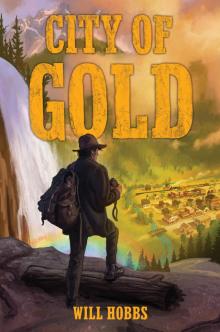 City of Gold
City of Gold Kokopelli's Flute
Kokopelli's Flute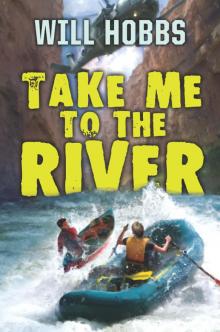 Take Me to the River
Take Me to the River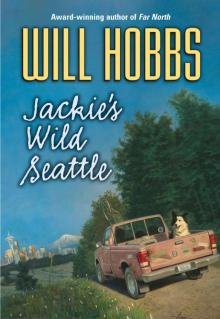 Jackie's Wild Seattle
Jackie's Wild Seattle The Maze
The Maze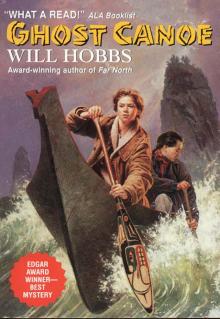 Ghost Canoe
Ghost Canoe Never Say Die
Never Say Die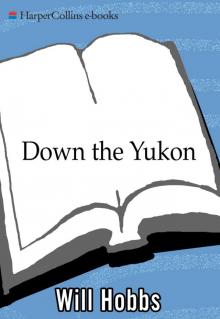 Down the Yukon
Down the Yukon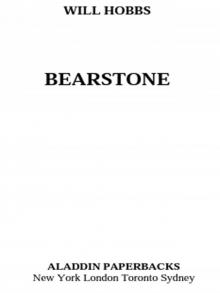 Bearstone
Bearstone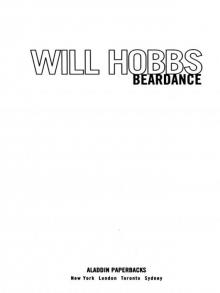 Beardance
Beardance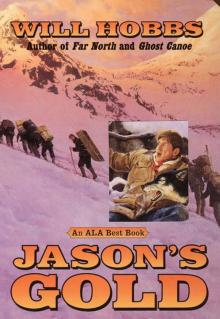 Jason's Gold
Jason's Gold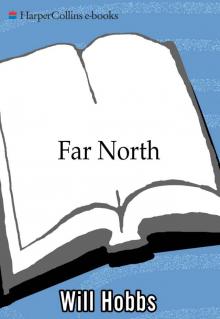 Far North
Far North The Big Wander
The Big Wander River Thunder
River Thunder Downriver
Downriver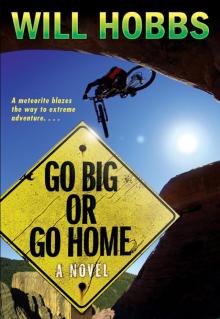 Go Big or Go Home
Go Big or Go Home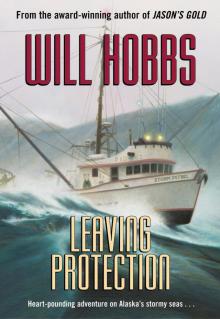 Leaving Protection
Leaving Protection Wild Man Island
Wild Man Island